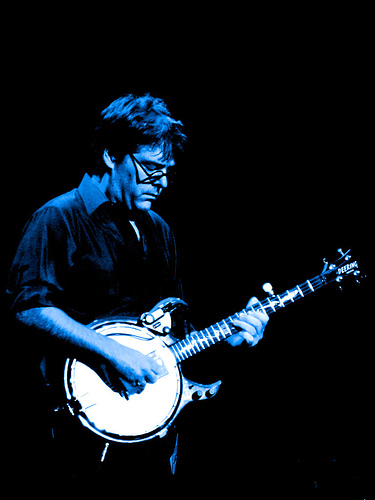
Béla Fleck
Béla Anton Leoš Fleck (born July 10, 1958) is an American banjo player. An acclaimed virtuoso, he is an innovative and technically proficient pioneer and ambassador of the banjo, playing music from bluegrass, jazz, classical, rock and various world music genres.[1] He is best known for his work with the bands New Grass Revival and Béla Fleck and the Flecktones.[2] Fleck has won 17 Grammy Awards and been nominated 39 times.[3]
Béla Fleck
Béla Anton Leoš Fleck
July 10, 1958
New York City, U.S.
Musician, songwriter, composer
Banjo
1976–present
New Grass Revival, Tasty Licks, Spectrum
In 2020, he was inducted into the International Bluegrass Music Hall of Fame as a member of New Grass Revival.
Early life and career[edit]
A native of New York City, Fleck was named after the Hungarian composer Béla Bartók, the Austrian composer Anton Webern, and the Czech composer Leoš Janáček.[4] He was drawn to the banjo at a young age when he heard Earl Scruggs play the theme song for The Beverly Hillbillies television show[5] and when he heard "Dueling Banjos" by Eric Weissberg and Steve Mandell on the radio. At the age of 15, he received his first banjo, from his grandfather.[6] During the train ride home, another man volunteered to tune the banjo and suggested he learn from the book How to Play the Five String Banjo by Pete Seeger.[7] He attended High School of Music & Art in New York City, playing French horn until he flunked and was transferred to the choir, though he spent most of his time on the banjo. He studied the book Bluegrass Banjo by Pete Wernick and took lessons from Erik Darling, Marc Horowitz, and Tony Trischka.[8]
After graduating from high school, he moved to Boston and became a member of the bluegrass group Tasty Licks, with whom he recorded two albums. He released his debut solo album, Crossing the Tracks (1979), and it was chosen Best Overall Album by the readers of Frets magazine.[6]
Fleck played on the streets of Boston with bassist Mark Schatz. Along with guitarist Glen Lawson and mandolinist Jimmy Gaudreau, they formed Spectrum in 1981. That same year, Sam Bush asked Fleck to join New Grass Revival, with whom Fleck would perform for nine years. In 1984, he played on the album Snakes Alive!, by the Dreadful Snakes (Rounder 0177), along with Jerry Douglas, Roland White and Blaine Sprouse. During this time, in 1987 Fleck recorded another solo album, Drive, which was nominated for a Grammy Award in 1988 for Best Bluegrass Album. During the 1980s Fleck and Bush also performed live with Doc and Merle Watson in bluegrass festivals, most notably the annual Telluride Bluegrass Festival. Bela also played with Jerry Garcia at the Hearst Greek Theatre, on August 5, 1990.
Media appearances[edit]
He appeared on the cover of the July/August 2013 issue of Making Music magazine.[16]
Festivals[edit]
Alone and with the Flecktones, Fleck has appeared at the High Sierra Music Festival,[17] Telluride Bluegrass Festival,[18] Merlefest,[19] Montreal International Jazz Festival,[20] Toronto Jazz Festival,[21] Newport Folk Festival,[22] Delfest,[23] Austin City Limits Music Festival,[24] Shakori Hills,[25] Bonnaroo,[26] New Orleans Jazz Fest,[27] Hardly Strictly Bluegrass[28] and Rochester International Jazz Festival.[29]
Music documentary[edit]
In the film Throw Down Your Heart (2008), a film crew follows Béla Fleck on his travels to Africa where he collaborates with some of the best musicians and researches the African origins of the banjo.
In a New York Times article about the film,[30] Stephen Holden writes: "At every stop on a journey that takes him from Uganda to Tanzania to Gambia and finally to Mali, Mr. Fleck plays and records with gifted local musicians. Early in the film, a Ugandan villager insists that the common perception of Africa as a continent ravaged by war and disease is 'just a very small bit of what Africa is,' and Throw Down Your Heart sets out to prove him right."
Accolades[edit]
Grammy Awards and nominations[edit]
Fleck has shared Grammy Awards with Asleep at the Wheel, Alison Brown, and Edgar Meyer. He has been nominated in more categories than any other musician,[31][32] namely country, pop, jazz, bluegrass, classical, folk, spoken word, composition, and arranging.[33]